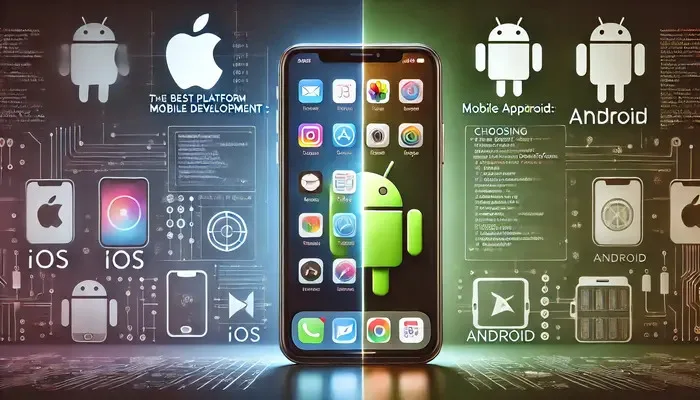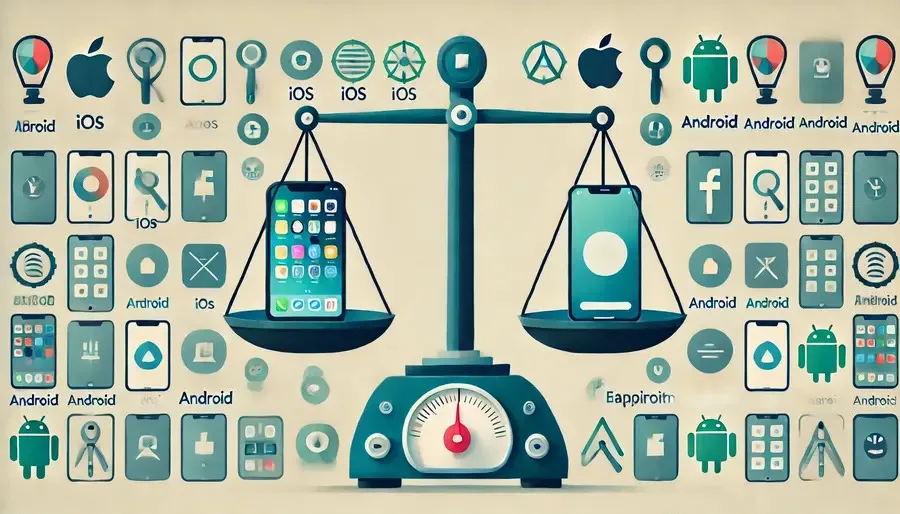How to Choose the Best Platform for Mobile Application Development: iOS vs. Android

Selecting the right platform for your mobile application can significantly influence its success. Both iOS and Android offer unique advantages and challenges. Understanding these differences can help you make an informed decision that aligns with your project goals and target audience.
Comparison of iOS and Android: Main Differences
iOS, developed by Apple, is known for its closed ecosystem and uniform user experience across devices. The limited range of devices (iPhones and iPads) ensures that iOS apps can be optimized for performance and stability. In contrast, Android, an open-source platform developed by Google, supports a wide variety of devices from different manufacturers. This diversity can lead to fragmentation, making it challenging to ensure consistent performance across all devices.
In terms of user interface and design, iOS emphasizes a clean, minimalistic design with strict guidelines, creating a seamless user experience. Android offers more flexibility in design, allowing developers to customize the user interface, which can result in a less uniform experience.
Market share and audience also differ between the platforms. iOS is generally preferred in Western markets, particularly in North America and Europe, and its users are often considered more affluent and willing to spend on apps and in-app purchases. Android dominates in emerging markets such as Asia, Africa, and parts of Europe, with a more diverse user base in terms of income and spending habits.
Examples of Successful Applications on iOS and Android
Several successful applications highlight the strengths of both platforms. For instance, 21 Point, an online casino app, leverages the secure environment and user engagement features of iOS to provide a premium gaming experience. On the other hand, apps like WhatsApp and TikTok have thrived on Android, reaching a vast and diverse user base worldwide.
Audience of Users: iOS vs. Android
Understanding your target audience is crucial when choosing a platform. Typically, iOS users are tech-savvy, prioritize security and privacy, and are willing to pay for quality apps. They are also more likely to adopt new technologies and updates quickly. In contrast, Android users value variety and affordability, often seeking customization options and being more price-sensitive. This platform is ideal for reaching a broader, more diverse audience.
Developer Ecosystem and Support
Apple provides comprehensive documentation, robust development tools (Xcode), and a supportive community. The App Store has strict quality guidelines, which can ensure higher app quality but may lengthen the review process. Google, on the other hand, offers extensive resources, including the Android Studio IDE and a large developer community. The Google Play Store is more lenient with app submissions, allowing quicker updates and iterations.

Development Time and Cost
Generally, iOS development can be faster and less costly due to the controlled environment and fewer devices to test. However, the App Store’s stringent review process might delay app launches. Developing for Android can be more time-consuming and expensive due to device fragmentation and the need for extensive testing. The advantage is a faster submission process and potentially lower publishing costs on Google Play.
How to Choose the Right Platform for Your Project
Identify your target audience, understand who your users are, where they are located, and what devices they prefer. Evaluate your budget and resources, considering the development and maintenance costs for each platform. Analyze market trends by researching the latest trends and user preferences in your industry. Consider the long-term goals of your project, thinking about future updates, scalability, and potential expansions to other platforms. If you aim to reach both iOS and Android users, consider using cross-platform development tools like Flutter or React Native.
Choosing between iOS and Android depends on various factors, including your target audience, budget, and project goals. By carefully evaluating these aspects, you can make an informed decision that maximizes your app’s success and user satisfaction.
Popular topics
-
 OpenTelemetry in Production...
OpenTelemetry in Production...By 2026, distributed systems are the norm rather than …
-
 Rate limiting and API abuse...
Rate limiting and API abuse...Rate limiting is one of those controls that looks …
-
 Backup Comparison in 2026: ...
Backup Comparison in 2026: ...Backups are one of those things most people only …
-
 High-Performance Networking...
High-Performance Networking...High-performance networking has become a core requirement for modern …
-
 Edge AI and TinyML: How Int...
Edge AI and TinyML: How Int...Edge-level artificial intelligence has become one of the most …
